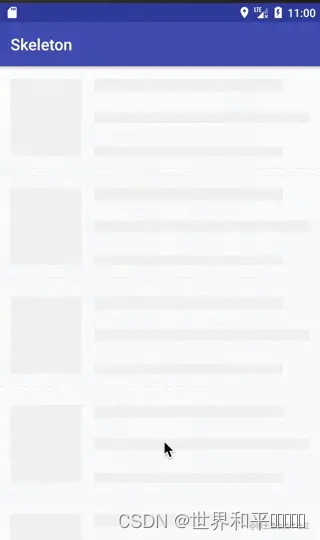本文实例为大家分享了js实现动态加载数据瀑布流的具体代码,供大家参考,具体内容如下
实现的功能
1.每次下拉到底部会自动加载下一页的数据
2.图片逐渐显示
首先html
<!DOCTYPE html>
<html lang="zh-CN">
<head>
<meta charset="UTF-8" />
<meta name="viewport" content="width=device-width, initial-scale=1.0" />
<title>Document</title>
<style>
* {
margin: 0;
padding: 0;
}
#wapper {
width: 1200px;
margin: 0 auto;
position: relative;
}
.wr_item {
position: absolute;
overflow: hidden;
}
img {
display: block;
width: 100%;
opacity: 0;
transition: opacity 3s;
}
</style>
</head>
<body>
<div id="wapper"></div>
<script src="https://www.atool.online/article/scroll.js"></script>
<script src="https://www.atool.online/article/data.js"></script>
<script src="https://www.atool.online/article/warpper.js"></script>
<script type="text/javascript">
new Wapper({
el: "wapper",
el_itemClassName: "wr_item",
colum: 8,
gap: 10,
}).init();
</script>
</body>
</html>接着是主要的js
;
(function (doc) {
// console.log('list', list);
var Wapper = function (op) {
this.el = doc.getElementById(op.el)
this.el_itemClassName = op.el_itemClassName
this.colum = op.colum
this.gap = op.gap
// 1.首先获取到每个照片外层盒子 也就是wr_item 的宽度
this.wr_item_w = (this.el.offsetWidth - (this.colum - 1) * this.gap) / this.colum
this.pageNum = 0
this.hightArr = []
this.pageSize = 4
}
Wapper.prototype = {
init() {
this.bindEvetn()
this.getData()
},
getData() {
// 这里默认一次获取30个照片 ,我这里了是假数据所以就不做别的了
// 一般这里是向后端请求数据
// list一共是有120
const partList = getPartList(this.pageNum)
if (partList) {
this.render(partList)
return true
} else {
return false
}
},
render(partList) {
// 只有数据存在才进行下面的操作
if (partList) {
partList.forEach((li, index) => {
const o_item = document.createElement('div')
// 这里要给o_item设置高度
// 不要想着用img撑开,这样做会导致不能够获取到o_item的offsetWidth
// 注意dom添加一个节点后,你是不能马上获取到其一些宽高的,
// 所以后端在返回数据的时候要给出高度
const imgW = li.width
const imgH = li.height
o_item.style.width = this.wr_item_w + 'px'
// 高度等于 盒子宽度x图片高度/图片宽度
const oitemH = (this.wr_item_w * imgH) / imgW
o_item.style.height = oitemH + 'px'
o_item.className = this.el_itemClassName
const img = new Image()
img.src = li.thumbURL
// 注意这里好像不能直接设置透明度,最好加个定时器触发重绘
// img.style.opacity = '1'
o_item.appendChild(img)
this.el.appendChild(o_item)
// 设置第一行
// 必须是第一页的数据
if (index < this.colum && this.pageNum === 0) {
this.hightArr.push(o_item.offsetHeight)
o_item.style.top = '0'
if (index + 1 % this.colum === 0) {
// 说明这是第一个
o_item.style.left = '0'
} else {
o_item.style.left = index * (this.wr_item_w + this.gap) + 'px'
}
} else {
const items = this.el.getElementsByClassName(this.el_itemClassName)
const minIndex = getMinIdx(this.hightArr)
const c_item = items[minIndex]
o_item.style.left = c_item.offsetLeft + 'px'
o_item.style.top = this.hightArr[minIndex] + this.gap + 'px'
this.hightArr[minIndex] += (o_item.offsetHeight + this.gap)
}
img.style.opacity = '1'
})
console.log('this.hightArr', this.hightArr);
this.el.style.height = this.hightArr[getMaxIdx(this.hightArr)] + 'px'
}
},
bindEvetn() {
var that = this
window.onscroll = function () {
if (getWindowHeight() + getScrollTop() === getHtmlScrollHeight()) {
console.log(that.pageNum);
that.pageNum++;
let hasNext = that.getData()
hasNext || that.pageNum--
}
}
}
}
function getPartList(pageNum) {
switch (pageNum) {
case 0:
return list.slice(0, 30)
break;
case 1:
return list.slice(30, 60)
case 2:
return list.slice(60, 90)
case 3:
return list.slice(90, 120)
default:
return null
}
}
// 找最小下标
function getMinIdx(arr) {
const minHeight = Math.min.apply(null, arr)
return [].indexOf.call(arr, minHeight)
}
// 找最大
function getMaxIdx(arr) {
const maxHeight = Math.max.apply(null, arr)
return [].indexOf.call(arr, maxHeight)
}
window.Wapper = Wapper
})(document)getWindowHeight() + getScrollTop() 是来检测浏览是不是滚动到底部的。
1.这里要注意几点 就是 后端给的数据 除了img的地址 还要给出每个img的宽高
2.在设置过渡 也就是我这里面的opacity:1的时候 要么在这之前触发回流操作 比如我这里有获取offsetHeight ,要么用一个定时器包括,否则这个过渡是不会生效的,图片会直接显示
3.后端每次返回的数据最好够多,否则会导致可能第一页数据不够多,导致没有出现滚动条 触发不了事件,当然最好是能自己写逻辑判断,后面有时间会完善这个代码,比如请求的选项也写到op里面,让用户手动传入
主要是大家理解这思路就好。
以上就是本文的全部内容,希望对大家的学习有所帮助,也希望大家多多支持阿兔在线工具。



